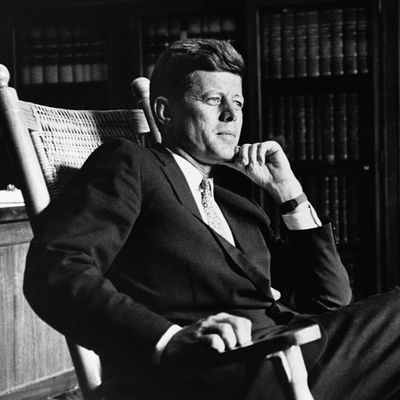
I grew up in the 1980s and became an adult in the 1990s, in a country whose political and cultural authorities believed it had been shaped irrevocably for the worse by John F. Kennedy’s assassination. Kennedy represented greatness — or at least incipient greatness tragically cut short. It was the last time government was good, before the ’60 revolt, Vietnam, and Watergate destroyed the public’s trust in it.
That belief still has purchase. C-Span’s latest Presidential Historians Survey finds that Kennedy has maintained his long-held rank among the pantheon of historical greats. Despite having served less than one term, and having left behind barely any accomplishments, he ranks eighth, according to a panel composed of academic historians, along with a smattering of presidential biographers.
Kennedy was elected president at the nadir of polarization, when differences between Republicans and Democrats were so faint it was frequently difficult to attribute coherent views to either party as a whole. This blurring of partisan differences made the president’s personality especially important. Whereas today’s polarized system almost guarantees that certain policy changes will follow a given partisan outcome — any Republican president elected in 2016 would have signed a big tax cut for the wealthy — in Kennedy’s time, the president’s personal issues of concern, and talent at handling Congress, mattered a lot.
Kennedy campaigned for office mainly on his youth and a promise to close the “missile gap” with the Soviet Union, which did not actually exist. He did promise some action on civil rights, but shelved his plans on the calculation that it would offend the conservative southern Democrats he needed to advance the rest of his domestic program. The Dixecrats held up his proposals anyway, and the two main domestic programs he had run on, federal aid for education and establishing a national health-insurance program for the elderly, went nowhere during his term.
Kennedy was frustrated by his lack of progress in Congress, but rationalized his failure as the product of broader historic circumstances. “Kennedy seemed to think he was a man born too late: He believed there were no great problems to be solved, no great dragons to slay, no great compromises to be made,” observed Richard Reeves in his biography.
To the extent that his reputation is attributable to anything substantive, it would be in his foreign policy. Kennedy approved a shambolic invasion of Cuba, and then bungled into a nuclear showdown with the Soviets that he managed to avert. His reputation benefits primarily from the contrast with his successor, who escalated the Vietnam War to a degree that it unraveled his presidency. Kennedy benefited from the unprovable assumption that he would have pulled out of Vietnam and accepted defeat much quicker than Lyndon Johnson, even though Kennedy’s policies laid the groundwork for his vice-president’s subsequent escalation, and followed the same calculation: that a Democrat could not afford the political cost of losing another country to communist expansion.
Kennedy’s retrospective luster resulted directly from the peace movement’s rage against Johnson. And while fury with the Vietnam catastrophe was utterly rational, that rage spilled over into myopia and outright delusion. Liberals suspected Johnson had conspired to kill Kennedy and take his job. They overlooked his extraordinary list of accomplishments, a list exceeded only by Franklin Roosevelt: the Civil Rights and Voting Rights Acts, Medicare, Medicaid, federal aid for housing, education, poverty, and more.
Much of Johnson’s Great Society was passed with the benefit of liberal congressional majorities he won in 1964, arising from circumstances (primarily the residual sympathy from Kennedy’s murder and the extremism of Barry Goldwater) that Kennedy did not enjoy. On the other hand, Johnson wrangled the 1964 Civil Rights Act out of the very same Congress that Kennedy couldn’t budge. Johnson’s success implies that Kennedy’s domestic stalemate was not entirely intractable, and that better legislative maneuvering might have produced a better result.
In an era when many old beliefs have been reexamined as the expression of privilege, it’s notable that the boomer view of the Good Kennedy and the Bad Johnson has remained largely unchanged. Yet one wonders how much of this mythos is specifically shaped by the perspective of the white middle class, which shared in the cost of Johnson’s disastrous war, but gained relatively little benefit from his enfranchisement of the Black South or enormous expansion of the welfare state. Kennedy’s poetic speeches hardly substituted for the dismantling of legal apartheid.
Liberals are habitually disenchanted with Democratic presidents. Since Franklin Roosevelt, who received only intermittent approval from the left in his time, progressives have experienced their party’s control of the White House, both good and bad, as almost unmitigated despair. During his short time in office, they were mostly disgruntled with Kennedy’s performance, and not without reason. He would almost surely have joined the pantheon of disappointment and regret were it not for his assassination. The enduring Camelot halo is a testament to the power of sentiment over analysis.






























